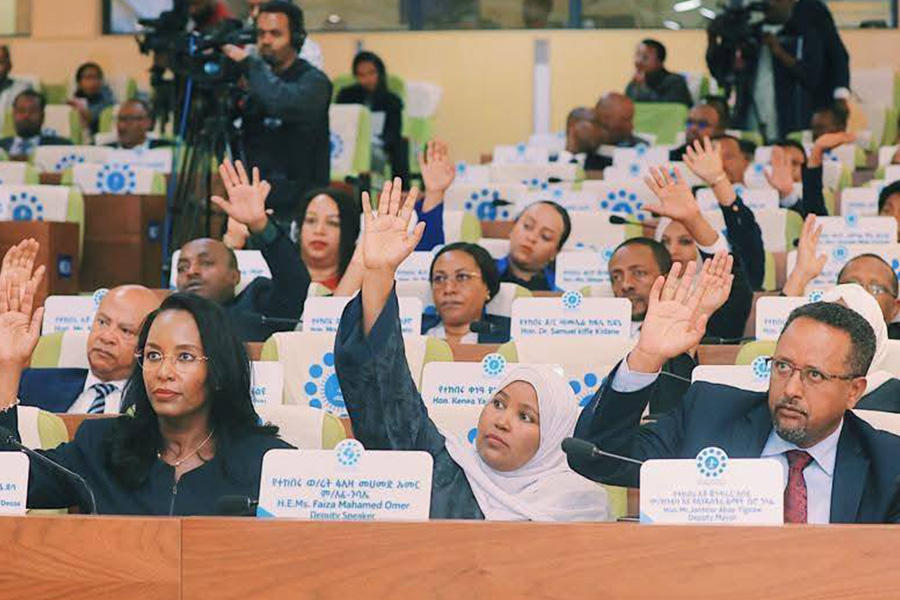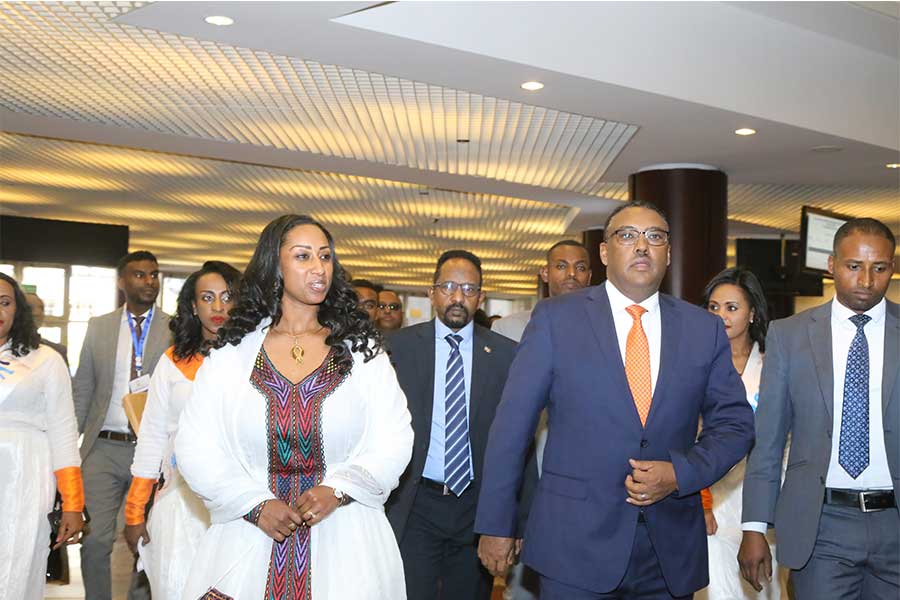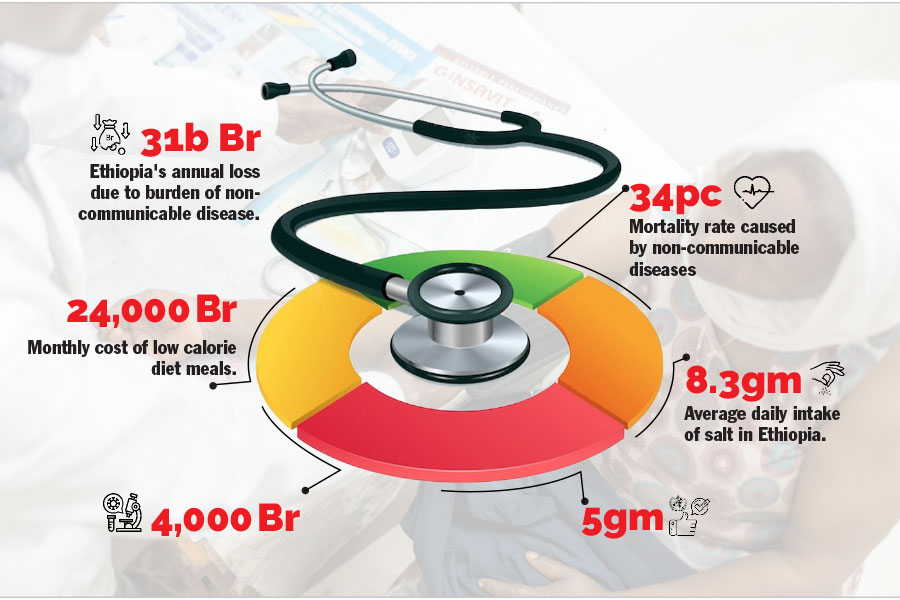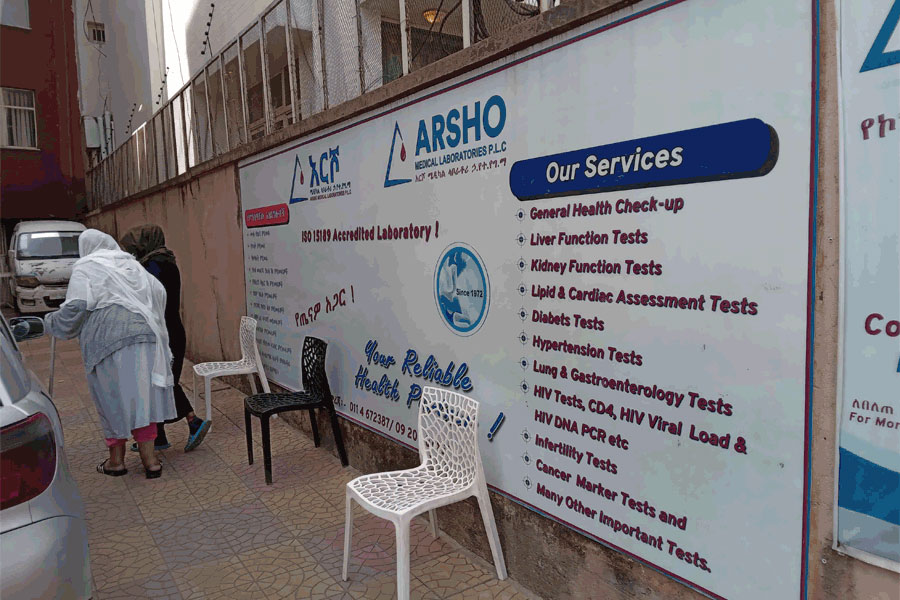
Oct 5 , 2019
By Ephraim Senbetta (PhD)
I felt compelled to write this article because of the pride I feel in my Ethiopian heritage and upbringing, and because I believe that a danger of epidemic proportions is threatening our identity.
My father’s mother tongue was Afaan Oromo and my mother’s was Amharic, but because I grew up in Addis Abeba, and because my father was bilingual, Amharic was the language my siblings and I spoke. I am focusing on Amharic, although Ethiopia is blessed with many languages. This is for no other reason than it is the only Ethiopian language I speak, and it is the federal government’s working language that happens to be widely spoken in Addis Abeba. All the other Ethiopian languages are national treasures that deserve our respect and protection as well.
It has been said that over 80 different languages and more than 200 different dialects are spoken in Ethiopia. Ethiopia is the only country in Africa that has its own alphabet. This is a lot to be proud of. What is worrying me is the assault on Amharic, as if it is an inadequate language that does not allow one to express thoughts without borrowing English words to supplement it. Young and old, the educated and those without any formal education, those who can speak English and those who cannot, most Ethiopians who live abroad and those at home, speak Amharic by sprinkling English words in it, some more generously than others. English words and names are also finding themselves in the written names of businesses, governmental departments, TV and radio programmes and even names of people replacing the names given to them at birth. The question is why?
The tendency to borrow English might be due to English being considered a sign of modernity or of being educated. We may also tend to believe that what is ours is not as good as what comes from abroad. I will leave the definitive answer to the social scientists who are better qualified, but I would like to share what I see and hear daily.
Some time back, I attended a meeting in Addis Abeba, where the speaker for the evening was a PhD whose name I do not recall and who gave an interesting talk. At the end of his speech when it was time for questions and answers, an elderly gentleman in the audience appreciated the content of the discussion and asked the speaker why on earth he spoke by mixing up Amharic and English in such an awkward manner. The speaker felt embarrassed and broke into a sweat. He was so used to his way of speaking that he was utterly incapable of answering the subsequent questions by just speaking Amharic, and he was too embarrassed to continue mixing it up.
I notice that governmental organisations are called agencies, commissions, directorates, even when they are written in Amharic. Does anyone really understand these terms and, at the federal level, can we not find equivalent and less confusing names in Amharic?
I once walked into the Ethiopian Light & Power Authority’s local office to pay my electric bill, and I came across a woman, who appeared to be the first point of contact for customers. I noticed the nameplate on her desk included her title written in the Ge'ez alphabet, which read “customer care advocate”. Why write her title using English words when a perfectly reasonable and more understandable title can be given in Amharic?
I have witnessed federal government employees giving talks in the countryside addressing bare-footed farmers in the usual way of mixing up the Amharic with English. I have often wondered what the farmers may be thinking as they heard the unintelligible talks. The speakers must have forgotten both their mission and their audience. The sad part is that the English words that were finding their way into the speeches were words for which commonly used Amharic words are available.
The Amharic expression of gratitude, "amesegenalehu," has almost entirely been replaced by the phrase "thank you".
It also appears that the naming of businesses, including restaurants that serve traditional food, seem to use names with English words. An interesting example is Bright House Kitfo. Yes, kitfo, our traditional dish. Almost all private schools in the various neighbourhoods in Addis Ababa are named “academy,” written in the Ge'ez alphabet, with the Amharic word for school becoming a thing of the past. Going back to the names of people, the name Dawit is now Dave, Michael is Mike, Samuel is Sam or Sami.
In daily conversations that I hear on the radio, the obsession with English is causing several radio personalities and guests first to use English words followed by the Amharic translations as if that is the way to make the conversation understandable. The other thing I have noticed is that the focus on using English words is leading to the misuse of English, such as when one commonly says, “I will communicate you,” which is to say I will let you know or I will communicate with you. The blue buses that are used to transport government employees have a sign written in the Geez alphabet, which reads “public service". Why use English words?
I am not sure to what extent English words are being mixed in our other Ethiopian languages, but I hope to a much lesser extent or not at all. Our languages are our treasures, why not care for and develop the wonderful assets that we have.
Languages evolve, and foreign words make their way into a language and become part of the language they are inserted in. This is certainly normal. My concern is that we have gone to the other extreme beyond what may be considered normal evolution of a language and into the realm of destroying a language and hence our identity.
I notice the beauty and richness of Amharic when spoken by those who speak it well, and it is rather breathtaking. A local language can also help express the culture and personality of a people in a manner no other foreign words can. I know this, because at one time I lived in Italy, and until I learned to speak Italian, I did not understand the people.
There is a stark difference between when one reads a prepared text in pure Amharic, which sounds lovely, and when he or she speaks off the cuff by inevitably and awkwardly inserting English words.
It saddens me that almost none of my postgraduate students can express themselves in unadulterated Amharic and they have considerable difficulty with English. Master's degrees are being awarded to students who can not speak well or express themselves in either Amharic or English.
If we do not pay attention to this epidemic, I wonder if Amharic will become obsolete, and we will end up creating a language like Creole, which is a mix of different languages that became a language within a relatively short period.
It would be rather inappropriate not to mention the bright spots by acknowledging at least a few individuals who can speak beautifully in the local language using English only for technical terms where there may not be the Amharic equivalent. To name a few, I appreciate listening to Mesfin Araya (Prof.), a psychiatrist who often speaks on mental health issues, Shewaferaw Shitahun, who speaks on economic matters on Sheger Radio, Daniel Kibret and Megabi Haddis Eshetu, who inspire us with their wisdom and thoughtful commentaries. They all demonstrate the fact that even a complicated subject can be communicated effectively to a local audience in a local language.
There was a recent interview given on Arts TV by Arvid Hogganvik (MD) and his two sisters, Norwegians born in Debre Tabor, Ethiopia. Although they have been back in Norway for decades, they can express themselves in fluent Amharic. Their interview shows that it is possible to speak a language well even after many years of being away from it, and expressions and words in a local language not only help communicate an idea better, but they can also elicit emotions, which are more powerful.
I spoke English most of my life while living abroad. Now that I live in Ethiopia, I am practising what I preach, and speak Amharic that surprises many who hear me. I am also diligently working to develop my vocabulary.
On September 9, 2019, we celebrated “Pride Day” for the first time throughout Ethiopia. What a fantastic idea, since we have so much to be proud of. I hope our pride will lead us, among other things, to the protection and development of our languages, all of them.
PUBLISHED ON
Oct 05,2019 [ VOL
20 , NO
1014]


Fortune News | Dec 07,2019

Fortune News | Sep 02,2023

Agenda | Sep 02,2023

Sunday with Eden | Sep 28,2024

My Opinion | 131987 Views | Aug 14,2021

My Opinion | 128376 Views | Aug 21,2021

My Opinion | 126313 Views | Sep 10,2021

My Opinion | 123931 Views | Aug 07,2021

Dec 22 , 2024 . By TIZITA SHEWAFERAW
Charged with transforming colossal state-owned enterprises into modern and competitiv...

Aug 18 , 2024 . By AKSAH ITALO
Although predictable Yonas Zerihun's job in the ride-hailing service is not immune to...

Jul 28 , 2024 . By TIZITA SHEWAFERAW
Unhabitual, perhaps too many, Samuel Gebreyohannes, 38, used to occasionally enjoy a couple of beers at breakfast. However, he recently swit...

Jul 13 , 2024 . By AKSAH ITALO
Investors who rely on tractors, trucks, and field vehicles for commuting, transporting commodities, and f...

Jul 5 , 2025
Six years ago, Ethiopia was the darling of international liberal commentators. A year...

Jun 28 , 2025
Meseret Damtie, the assertive auditor general, has never been shy about naming names...

Jun 21 , 2025
A well-worn adage says, “Budget is not destiny, but it is direction.” Examining t...

Jun 14 , 2025
Yet again, the Horn of Africa is bracing for trouble. A region already frayed by wars...

Jul 6 , 2025 . By BEZAWIT HULUAGER
The federal legislature gave Prime Minister Abiy Ahmed (PhD) what he wanted: a 1.9 tr...

Jul 6 , 2025 . By YITBAREK GETACHEW
In a city rising skyward at breakneck speed, a reckoning has arrived. Authorities in...

Jul 6 , 2025 . By NAHOM AYELE
A landmark directive from the Ministry of Finance signals a paradigm shift in the cou...

Jul 6 , 2025 . By NAHOM AYELE
Awash Bank has announced plans to establish a dedicated investment banking subsidiary...